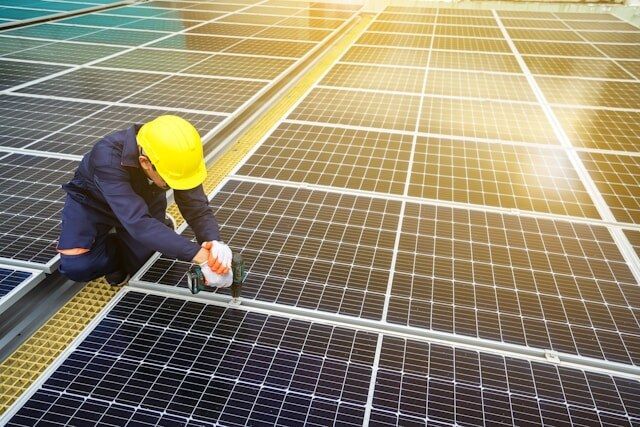Abbotsford Solar Installation
Hiring a solar energy contractor is becoming increasingly appealing to Canadians as electricity rates rise and energy imports become unpredictable.
FortisBC has announced a 5.65% rate increase starting January 1, 2025, with the average residential customer expected to pay an additional $7.88 monthly.
Meanwhile, BC Hydro has yet to finalize its rate adjustment for the 2025-26 fiscal year, though it is expected to be below inflation. The necessity of solar panels from Abbotsford Solar Installation is evident, as electricity prices are expected to only go up from here.
Key Takeaways:
- FortisBC’s 5.65% hike and BC Hydro’s expected increase make installing solar panels more cost-effective.
- Lower solar panel installation costs, government incentives, and net metering reduce payback time.
- Renewable sources cut reliance on rising utility rates and unstable imported power.
The Rising Cost of Electricity in British Columbia
For many residents, electricity bills are becoming unaffordable. Some households now face the difficult choice between paying their power bill and covering other essential expenses. This financial strain is compounded by the increasing costs of housing and food.
FortisBC’s Increased Rate
The cost of electricity in BC has been steadily increasing, and 2025 is no exception. The British Columbia Utilities Commission (BCUC) approved FortisBC's 5.65% interim rate increases due to rising power generation, infrastructure maintenance, and consumer demand.
“Customer demand for power continues to grow, along with the cost of purchasing power. To ensure we can meet our customers’ growing needs and invest in our system for safe and reliable energy delivery, we will be adjusting electricity rates,” said Michelle Carman, vice president of customer service and external communications at FortisBC.
BC Hydro’s Anticipated Increase
BC Hydro, which serves most of the province outside of FortisBC’s service area, has not yet submitted its request for a rate adjustment for the fiscal year beginning April 1, 2025. However, recent trends suggest that increases are inevitable. In 2024-25, the BCUC approved a 2.3% increase in BC Hydro rates.
Influence of Geopolitical Factors
Canadian electric prices are already complicated, and international issues like the United States tariffs only worsen things. Almost 25% of British Columbia's power comes from outside sources, with the United States providing the great majority (almost 80%). The proposed 25% tariff on Canadian goods, championed by U.S. President Donald Trump, could significantly increase the cost of imported electricity.
“I don’t think that will be the immediate effect, but 25 per cent tariffs… I think those would have a profound impact,” said BC Minister of Energy and Climate Solutions Adrian Dix.
These increasing costs and the potential for future supply challenges make renewable solutions, like installing a solar panel system, more compelling than ever.
BC’s Electricity Supply Challenges
Despite BC's hydroelectric abundance, drought has caused the province to import more energy than it exports. Former Minister of Environment Barry Penner warned that BC has been forced to import 20-25% of its electricity over the past two years.
“The plan to meet our [peak demand] shortfall in the late 2020s is to import electricity,” said Penner. “All of this creates an element of uncertainty.”
While the government has approved nine major wind projects and a 104-megawatt project to help offset this shortfall, critics remain concerned about long-term electric security.
John Rustad proposed nuclear and gas as alternatives and has argued that British Columbia should diversify its energy mix beyond intermittent renewables.
However, as the province continues to expand its renewable electric infrastructure, the case for individual and commercial solar panel installations becomes stronger. Reducing reliance on unpredictable utility rates and imported power, the sun offers a decentralized, resilient, and affordable electric source.
How Solar Electricity Overpower These Challenges
While electricity bills are rising, residential and commercial customers have sustainable solutions available. These options offer various payment plans and empower residential and commercial customers to achieve lower and more stable electricity bills through energy efficiency measures.
Payback Period and ROI
The cost of solar PV systems has dropped significantly in recent years. It is more cost-effective today than it was 10 years ago.
- A typical residential solar system in BC now costs between $12,000 and $30,000.
- With BC’s Net Metering Program, homeowners can sell excess output back to the grid to further offset costs.
- Many homeowners see a return on investment (ROI) within 8-12 years. Given that a solar energy system lasts 25-30 years, this translates to decades of essentially free electricity with a reduced carbon footprint.
Protection Against Rate Increases
Solar power users don't feel the pinch of utility rate increases as much because the panels produce their own electricity. Using this, even in part, helps lessen reliance on the grid and the financial burden of increasing rates.
Government Incentives and Rebates
BC and the federal government offer various incentives to encourage renewable energy adoption. Programs like the Canada Greener Homes Loan and Canada Greener Affordable Housing provide zero to low-interest financing for eligible energy-efficient home retrofits.
Be Energy Independent With Off-Grid Systems
Big power companies tell you to stick with them for reliable electricity. The funny thing is that they also use this to raise prices every year. They tell you not to trust solar installers, batteries, or generators, saying they'll take care of everything – for a price. However, relying on these big companies for residential and commercial projects isn't always the best idea because their service can also be unreliable.
Choosing a solar panel installation company gives you more control over your energy costs and helps avoid power outages.
Enhancing Grid Stability
One way to make the grid more resilient is to have a decentralized energy network that uses solar photovoltaic power extensively. By reducing system pressure during peak demand periods, solar array units avoid blackouts and service interruptions.
Greater Energy Independence
Using less imported power is smart, given U.S. trade policy uncertainties and anticipated electricity taxes. Roland Clift, an adjunct professor at UBC, emphasized the importance of electrical independence in the face of political and economic uncertainties.
“The threat of tariffs means, Oh, hang on, we’ve gotta be more independent, therefore we have to get a move on with this,” Clift said.
Solar output is a great way for homes and companies to become self-sufficient and reduce their reliance on unstable imports.
Why Now is the Best Time to Go Solar in BC
| Avoid Rising Rate | A great long-term investment because electric prices are only going up. |
|---|---|
| Incentives | Government incentives are at an all-time high due to British Columbia's commitment to reach net-zero emissions by 2050. |
| Increase Property Value | Homes with PV installations have higher resale values and appeal to buyers. |
| Energy Independence | Lessen your need for utility companies and imported power to safeguard yourself from future price and supply shocks. |
| Sustainable Future. | Transitioning to solar contributes to BC’s climate goals and helps create a cleaner, more resilient electric grid with reliable power. |

Reach Out to a Reliable Solar Energy Contractor | Call Abbotsford Solar Installation
Electricity prices in British Columbia are on the rise, and residents face regulatory uncertainty and the possibility of tariff-driven price spikes. With its long-term stability, financial savings, and environmental benefits, solar output is an effective way to offset these costs.
Choosing Abbotsford Solar Installation as your energy provider has never been more convenient or appealing than now. Many happy solar customers have shared their experiences with our operating costs and system design.
Get in touch with us if you're thinking about going solar for your house or company before power rates go any higher.
Frequently Asked Questions
Can these panels protect me from power outages?
Safety requires grid-tied systems to shut down during power outages. However, if you have a battery storage system, you can store excess output and use it during blackouts.
Will BC Hydro or FortisBC buy back all my excess energy?
Yes, but they don’t provide unlimited buybacks. Any excess output you generate first offsets your own bill. Credits can be added to future invoices if you produce more output than you use.
It’s important to note that BC Hydro does not pay for accumulated credits, which expire annually. FortisBC gives out leftover credits at wholesale rates at year's end.
Can I add more panels later if my needs increase?
Yes, but your existing inverter must be able to handle additional capacity. If you plan for future expansion, installing an oversized inverter or a modular system makes adding more panels easier.
